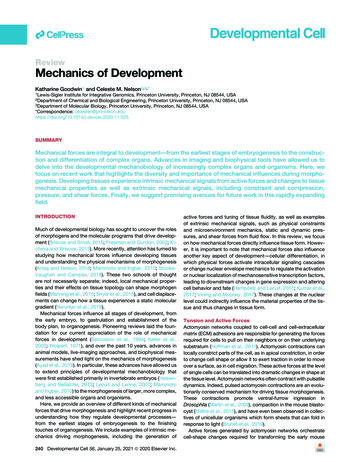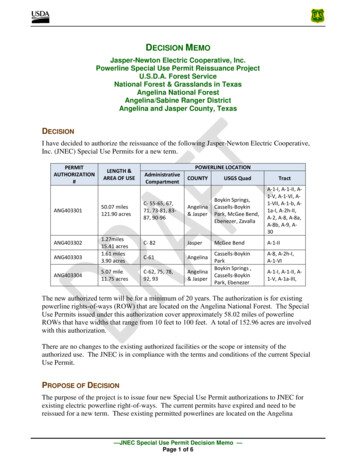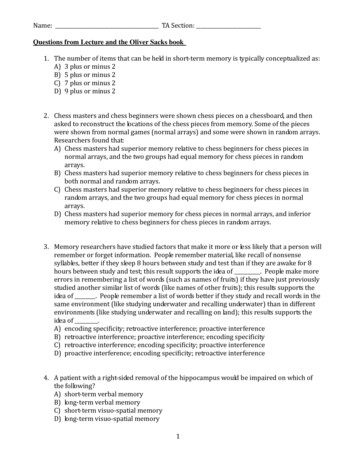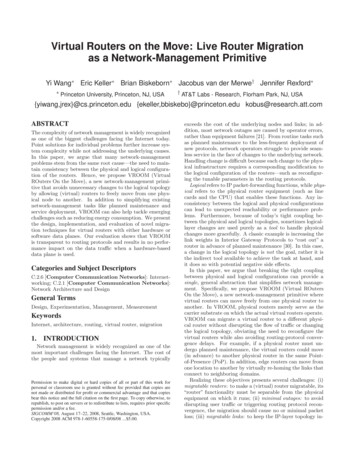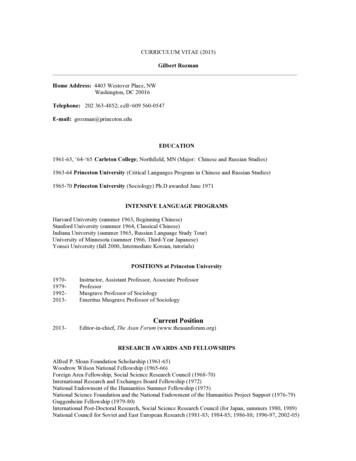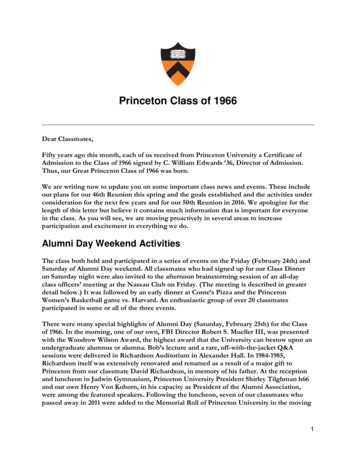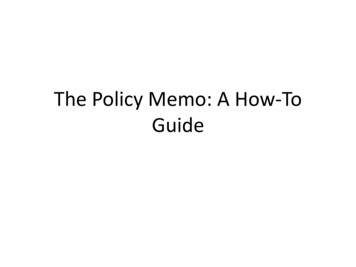
Transcription
The Policy Memo: A How-ToGuide
How Not to Make Decisions
Power Point isGood For - Conveying simpleinformation Spiced up with graphicsBad For - Conveying complex subtleinformation MAKING DECISIONS!
The right tool for decisionmaking is the policy memoWhy?
A Good MemoPresents information arrayed for effectivedecision making– Helpful Overall Organization The Problem, Key Facts, Options, Options Analyzed,Recommendation– “Layered” Presentation of information The “onion”: Layer 1, Layer & Layer 3– A full range of logical options– Honest Presentation of Pros and Cons for each– A clear recommendation
After you read a good memo - You understand what the problem is You see what the possible decision options are You understand the benefits, costs, anddangers of the options – what could work, andwhat could go wrong– Policy-wise– Politically You hear a clear & honest recommendationand you understand the logic behind it
The Point Is NOT to persuade the Boss to your favoriteposition IS to help the Boss make an informed choiceof the option that best serves HER interest
Organization Distinct sections, clearly markedUpfront recommendationForthright statement of the problemAll the key facts, but no moreMultiple OptionsAnalyzed! Political cost/benefit analysisRecommendation
Style Short, clear sentences with active verbs– Don’t waste words– KISS: Keep It Short, Stupid! Brief tight paragraphs– No big blocks of impenetrable prose Key points highlighted, e.g, with bold, italics,underlining– But not too much!!!
The Elevator TestThe memo should be so clearly organizedand its points so well-packaged that whenyou give it the Boss at ground level sheunderstands the recommendation by thetime she reaches the power floor.
The OnionFacts should be presented in clear layers like an onion: the“trees” in layer 1, the “shrubs” in layer 2, the “weeds” inlayer 3.-- Read 1 gives the highlights. The Principal’s time is precious, the onion economizes on it-- Read 2 supplies the essential logic. If she decides to invest more time she needs the logic-- Read 3 buttresses with the needed facts. The onion makes key facts easy to find if she wants them. Supporting facts there but only if desired by the Principal
10 Common Mistakes
1. CheerleadingOne-sided advocacy of therecommended option Glossing over the downsides, costs, or risks of thefavored option Ignoring the advantagesor strengths of otheroptionsRemember: Political analysisis not the same thing aspolitical advocacy.
2. Academic WritingTurgid, stuffy, boring prose Avoid footnotes, blockquotes, or invocation ofauthority Use the active voice Avoid slang but make itsnappyRemember: Effectivecommunication demandseffective writing
3. Wasting SpaceUseless sentences that addnothing Repeating basic materialfrom the case itself Adding platitudes orvague generalitiesRemember: Every sentencecounts so be ruthless withcuts
4. Poor Lay OutConfused, jumbled, oroverly intricate organization Hidden recommendations No sign-posting No highlighting for keypointsRemember: The Principalshould be able to read thememo in one fast gulp andgrasp the essentials.
5. Deadly Blocks of ProseDense paragraphs requiringintense concentration Use short snappyparagraphs Cut words withtelegraphic bullet points Provide helpful visualcuesRemember: Your job is tomake reading easier, notharder
6. Dancing BaloneyOver-use of highlighting Weird fonts Too much underlined,italicized, or bolded Buzzing distractingirritating pageRemember: Don’t overdoit, less can be more
7. Errors of FactFailing to read the promptcarefully Omits key facts Misrepresents key facts Messes up proceduresor institutional detailsRemember: Get the detailsright.
8. Loop Hole ChasingLooking for a magic bullet Exploiting a peculiarity inthe assignment to avoidfacing tradeoffs orconfronting hard issues This is cheating, more orless.Remember: If there were asimple magic bullet, wewouldn’t use the situationas a case.
9. Lack of SpecificityGeneralities are useless Give concrete actionablerecommendations Indicate: Who, What,When, Where, and How Name namesRemember: The Principalshould leaving knowingexactly what to do next.
10. Wishful ThinkingPolitical conflict is real, youmust deal with it Fails to find and addressgenuine interests Confuses conflict ofinterests with conflict ofpersonalities Isn’t realistic aboutBATNA (own and others)Remember: Politics ain’tbeanbag
Guide to Grading
AAB BB-C CCDSolid policy analysis and truly acute political analysis. Firm grasp of political interestsand motivations, insightful about institutions. Clear effective organization andpresentation. Lean, hard-hitting prose. Honest about both up-sides and down-sides– no cheer-leading. Specific about what the principal should do and not do. Creativetouches, clever out-of-the-box thinking. Would genuinely be helpful to the principal.A: Exemplary in every regard, a simply outstanding job. A-: Almost as good.Solid policy analysis and generally credible political analysis. May show someweaknesses or omissions. Possibly limited insight into political interests ormotivations, some flat-footedness about institutions. Slightly muddled organization.Some flabbiness in writing. Vagueness or lack of specificity in somerecommendations or action plan. Muffled analysis of down-sides, somedisingenuousness, weak fall-back options. Makes obvious points but missessubtleties. Somewhat helpful to principal but missed opportunities. B : Very goodmemo with no critical weaknesses but not truly exceptional across the board. B:Gets most things right but not outstanding in any particular regard, may make somesignificant miss-steps or omissions. Average. B-: More glaring problems oromissions. Very incomplete or fragmentary political analysis.Misses the point of the exercise. Missing or deeply fundamentally flawed politicalanalysis. Little or no insight into political interests or motivations, confusion aboutor serious misunderstanding of institutions. Flabby, diffuse writing. Confused orweak organization, puts burden on reader. Vague generalities rather than specificadvice. Cheer-leading, little attention to risks or down-sides. Memo useless or awaste of time for principal, recommendation likely to fail or prove politicallydisastrous.
Resources on Memo Writing The Bob Behn memo/ the JFK Schoolapproach 2/07/Behn-Craft-ofMemo-Writing-2013-3rev8 26 13.pdf Useful from the Harris School with links /harris-school-writing-program/policymemo-guides
1.2.3.4.5.6.7.8.9.‘Cheer-leading.” One-sided advocacy of the recommended option. This mayinvolve glossing over the down-sides, costs, or risks of the favored option. Or, itmay arise from ignoring the advantages or strengths of the other options.Remember: political analysis is not the same thing as political advocacy.Academic writing. Avoid unnecessary apparatus like footnotes, quotes, orinvocation of authority. Stilted, stuffy, or pedantic writing hurts.Wasting space, especially repeating basic material from the case itself. Everysentence must count.Flunking the “elevator test.” Confused or overly intricate organization, hiddenrecommendations, no sign-posting or highlighting key points. The Principalshould be able to read the memo on an elevator or in a taxi in one fast gulp, andthe logic should be perfectly clear.Dancing baloney. The opposite problem: too many type faces, bullets, italics tobe useful, so the memo is cluttered, irritating and confusing.Errors of fact. Probably evidence of haste but still its bad.Loophole chasing. Trying to exploit some little peculiarity in the assignment inorder to avoid facing tradeoffs or confronting the hard issues. This is cheating,more or less. If there were a simple magic bullet, we wouldn’t use the situationas a case.Lack of specificity. Especially about political actions. The memo should giveconcrete actionable recommendations, name names, tell the Principal what heor she should do and how to do it.Wishful thinking about political conflict. In high stakes, high conflict situations,people are not going to join hands and sing kumbaya. Deal with it.
- No big blocks of impenetrable prose Key points highlighted, . touches, clever out-of-the-box thinking. Would genuinely be helpful to the principal. A: Exemplary in every regard, a simply outstanding job. . Memo-Writing-2013-3rev8_26_13.pdf Useful from the Harris School with links


